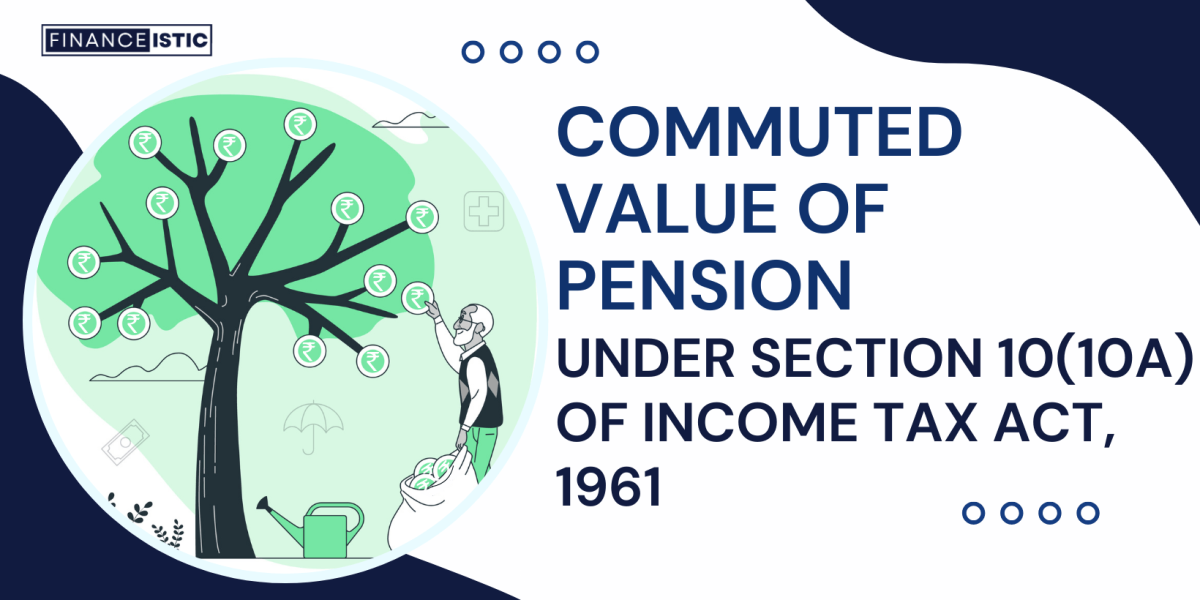According to the Income Tax Act,1961 there are various sections that accepts the right of the taxpayer to reduce income which is taxable. One among these sections is the section 10(10A) that provides a specific tax exemption for a particular class of persons. In this article we will discuss about section 10(10A) of Income Tax Act, 1961 in detail.

Table of Contents
What is section 10(10A) of income tax act 1961?
Section 10(10A) provides a tax exemption for retired employees who receive a commuted pension. Normally, pensions are taxable under the head ‘Salaries’ in income tax return and are typically paid monthly. However, you can opt to receive your pension as a lump sum which is known as a commuted pension instead of regular installments. This lump sum payment made by the government qualifies for a tax exemption under section 10(10A) of Income Tax Act, 1961. This benefit reduces the tax liability for retirees who choose to receive their pension in a single lump sum.
Applicability of Section 10(10A) of Income Tax Act
This section applies exclusively to government employees whether they are the central or state government employees receiving a commuted pension at the time of retirement. Private sector employees or government employees receiving regular monthly pension payments do not qualify for the tax exemption under Section 10(10A). However they can take such benefit under other section for commuted value of pension received.
Who is eligible under section 10(10A)
The below person are eligible to claim the tax exemption under this section.
- Retired employees from Central or state government
- Retired employees from Specific organizations with similar pension schemes
This benefit under this section is not applicable to private sector retirees or those receiving regular monthly pensions.
Amount of Exemption under section 10(10A)
The full amount of a commuted value of pension received is exempt from income tax as per section 10(10A) of Income Tax Act, 1961. However uncommuted value of pension received or any regular periodic pension payments are fully taxable under the head of salary.
What is commuted value of pension under section 10(10A)?
A fixed amount is contributed in annuity fund by both the employer and the employee which then pays the pension to the employee after the retirement. However, upon retirement, you have the option to take a portion of your pension as an advance that is known as a commuted pension. This commuted or lump sum pension is fully tax exempt for government employees. The tax exemption on commuted value of pension received is partial for non-government employees under other section and depends on whether the employee also receives gratuity. This exemption for commuted pension is available under both tax regimes.
What is uncommuted value of pension received?
The pension payments received periodically like a monthly basis is known as uncommuted pension. These uncommuted pension payments are fully taxable under the head of salary in Income tax return.
Conditions to avail the exemption under section 10(10A)
No specific conditions have been given for claiming the exemption under Section 10(10A). However, to claim the tax exemption under this section, you are required to be:
- A retired government employee from central or state government
- Receiving a commuted value of pension at the time of retirement.
Key Points to be remember for section 10(10A)
Full Tax Exemption: Section 10(10A) provides a complete tax exemption on the full commuted value of pension received without any maximum limit.
Interest Income: The commuted value of pension received is tax exempt but not Interest Income of commuted pension, hence any interest income earned on the pension amount after it is received is taxable as interest income under head of “Other Income”.
Other Tax Benefits: If you take tax exemption under this section, it does not affect your eligibility for other tax benefits available to senior citizens or retirees.
Read Also: Section 10(7) of Income Tax Act, 1961 – Exemption for Government Employees
Final Words
Section 10(10A) of Income Tax Act provide a major tax benefit for retired government employees receiving a commuted value of pension that allow them to keep more of their retirement funds. If you are a retired government employee, then to get update about Section 10(10A) can be beneficial for your financial planning.
Frequently Asked Questions (FAQ)
Pension is taxable under the head of salary.